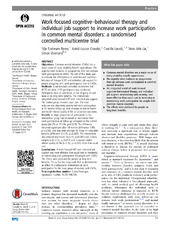| dc.contributor.author | Reme, Silje Endresen | |
| dc.contributor.author | Grasdal, Astrid Louise | |
| dc.contributor.author | Løvvik, Camilla | |
| dc.contributor.author | Lie, Stein Atle | |
| dc.contributor.author | Øverland, Simon Nygaard | |
| dc.date.accessioned | 2015-12-21T10:59:36Z | |
| dc.date.available | 2015-12-21T10:59:36Z | |
| dc.date.issued | 2015-08-06 | |
| dc.Published | Occupational and Environmental Medicine 2015, 72(10):745-752 | eng |
| dc.identifier.issn | 1351-0711 | |
| dc.identifier.uri | https://hdl.handle.net/1956/10785 | |
| dc.description.abstract | Objectives: Common mental disorders (CMDs) are a major cause of rising disability benefit expenditures. We urgently need evidence on programmes that can increase work participation in CMDs. The aim of this study was to evaluate the effectiveness of work-focused cognitive–behavioural therapy (CBT) and individual job support for people struggling with work participation due to CMDs. Methods: A randomised controlled multicentre trial (RCT) including 1193 participants was conducted. Participants were on sick leave, at risk of going on sick leave or on long-term benefits. The intervention integrated work-focused CBT with individual job support. The control group received usual care. The main outcome was objectively ascertained work participation at 12 months follow-up, with changes in mental health and health-related quality of life as secondary outcomes. Results: A larger proportion of participants in the intervention group had increased or maintained their work participation at follow-up compared to the control group (44.2% vs 37.2%, p=0.015). The difference remained significant after 18 months (difference 7.8%, p=0.018), and was even stronger for those on long-term benefits (difference 12.2%, p=0.007). The intervention also reduced depression (t=3.23, p≤0.001) and anxiety symptoms (t=2.52, p=0.012) and increased health-related quality of life (t=2.24, p=0.026) more than usual care. Conclusions: A work-focused CBT and individual job support was more effective than usual care in increasing or maintaining work participation for people with CMDs. The effects were profound for people on long-term benefits. This is the first large-scale RCT to demonstrate an effect of a behavioural intervention on work participation for the large group of workers with CMDs. | en_US |
| dc.language.iso | eng | eng |
| dc.publisher | BMJ (British Medical Journal) | eng |
| dc.rights | Attribution CC BY | eng |
| dc.rights.uri | http://creativecommons.org/licenses/by/4.0 | eng |
| dc.subject | Common mental disorders | eng |
| dc.subject | Cognitive behavioural therapy | eng |
| dc.title | Work-focused cognitive-behavioural therapy and individual job support to increase work participation in common mental disorders: a randomised controlled multicentre trial | eng |
| dc.type | Peer reviewed | |
| dc.type | Journal article | |
| dc.date.updated | 2015-09-03T11:24:37Z | |
| dc.description.version | publishedVersion | |
| dc.rights.holder | Copyright the authors | eng |
| dc.identifier.doi | https://doi.org/10.1136/oemed-2014-102700 | |
| dc.identifier.cristin | 1257291 | |
| dc.subject.nsi | VDP::Medisinske Fag: 700 | |

